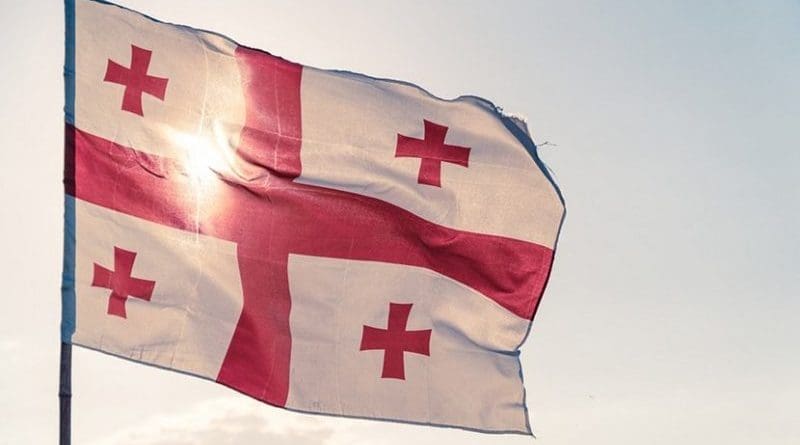Georgian Parliament Pushes ‘Foreign Agents’ Bill Despite Mass Protests, Western Warnings
By RFE RL
(RFE/RL) — Georgia’s parliament is set to vote on April 30 on the second reading of a so-called “foreign agents” bill — regarded by many as mirroring one used by the Kremlin to silence its critics — amid growing protests and Western warnings that the law is intended to control civil society.
NGOs opposed to the law have called for a fresh demonstration on April 30 outside the parliament building — the latest in a series of protests attended by tens of thousands of people over the past two weeks against the legislation put forward by the ruling Georgian Dream party.
Critics call the bill “the Russian law,” and President Salome Zurabishvili, who has distanced herself from the policies of the ruling party, has promised to veto it if it is formally adopted in a third reading, as expected.
However, the government has the votes to override a veto and has said it will do so.
The Georgian Dream staged a large counterdemonstration outside the parliament building in support of the bill on April 29, ferrying in people from all over the country.
Ex-Prime Minister Bidzina Ivanishvili, the influential billionaire founder of Georgia’s ruling Georgian Dream party, lashed out at opponents of the bill during a speech at the rally in support of the bill, while accusing foreign intelligence agencies of interfering in the Caucasus country’s internal politics.
Another former prime minister, Irakli Gharibashvili, currently the chairman of Georgian Dream, and other party leaders say the legislation is intended to increase transparency in the country’s political environment.
In a statement announcing the fresh protest, some 20 NGOs accused Ivanishvili and Georgian Dream that “by adopting the Russian law, they are planning repression against the people…election-rigging, censorship, and a Soviet-style totalitarian regime.”
If adopted, the law would require organizations and groups to register as “foreign agents” if they receive more than 20 percent of funding from abroad.
The battle over the legislation has highlighted Georgia’s precarious relationship with Russia.
Anti-Russian sentiment can often be strong in Georgia. Russian troops still control around one-fifth of Georgian territory, most of it taken during a lightning war in 2008 that was ostensibly about breakaway efforts in two northeastern regions, Abkhazia and South Ossetia.
While the government remains against Russia’s occupation and also supports Ukraine in its war with Russia, it has also made moves to align itself more economically with Moscow, and the opposition has accused Ivanishvili of using his influence to push the country in a pro-Russia direction.
The European Union, which gave Georgia candidate status in December, has said that adoption of the bill, which is “incompatible” with the bloc’s values, would disrupt the country’s membership hopes.
On April 29, two influential U.S. lawmakers said the bill was mirroring the one pushed by Russian President Vladimir Putin, calling the bill “incredibly concerning” and urging Georgia’s government to listen to its people and reverse it.
“Putin used this ‘foreign agents law’ to drastically curb free speech, all but eliminate Russian civil society, and further solidify his brutal rule as a dictator,” Representatives Gerry Connolly (Democrat-Virginia) and Austin Scott (Republican-Georgia), the co-chairs of the Congressional Georgia Caucus, said in a statement.
“It is incredibly concerning for the Republic of Georgia, a democratic partner of the United States that has received EU candidate status, to introduce and advance legislation that mimics Putin’s same anti-democratic instrument,” Connolly and Scott said in their statement.
“We continue to support the Georgian people in their path to Euro-Atlantic inclusion and urge leaders to heed their calls for a flourishing and unimpeded civil society, independent judiciary, and a government that respects the rule of law and holds those who engage in corruption accountable,” the statement said.
Before going to the vote in a plenary session on April 30, the parliament’s Legal Committee on April 29 approved the second reading during a stormy session that saw all opposition members expelled from the premises.
Online and print media reporters were also banned from attending the session, with organizers only giving access to accredited news outlets due to “security” reasons.
The press center also banned visitors, with the exception of those “invited by the relevant structures,” from entering the building.
Georgian Dream introduced the legislation last year but was forced to withdraw it following mass protests. The party’s parliamentary group brought the law back with minor wording changes and passed its first reading on April 17, again triggering unrest.
The final reading of the bill is scheduled to be debated on May 17.

